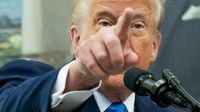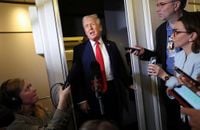President Donald Trump is set to unveil a sweeping new round of tariffs on April 2, 2025, a date he has dubbed "Liberation Day." This significant economic maneuver aims to alter the dynamics of international trade, particularly targeting countries that he claims have taken advantage of the United States for decades. The tariffs will apply broadly, affecting major trading partners such as China, the European Union, Mexico, and Canada, among others.
Trump's tariffs are expected to be the most aggressive since the trade policies that contributed to the Great Depression. He has characterized these measures as a necessary response to the $1.2 trillion trade deficit the U.S. faced in 2024, asserting that the time has come for the U.S. to reclaim its economic strength. In a post on his platform Truth Social, he declared, "For DECADES we have been ripped off and abused by every nation in the World, both friend and foe. Now it is finally time for the Good Ol’ USA to get some of that MONEY, and RESPECT, BACK." This rhetoric reflects a nostalgic view of high tariffs as a path to prosperity.
Trump's administration has labeled the upcoming tariffs as "reciprocal," meaning they will match the rates charged by other countries on U.S. exports. Treasury Secretary Scott Bessent noted that each country will receive a specific tariff number based on their trade practices with the U.S. He referred to a group of nations, dubbed the "dirty 15," which contribute significantly to the U.S. trade deficit and are expected to face substantial tariffs.
Among the countries most affected will be China, the EU, Mexico, Vietnam, Taiwan, Japan, South Korea, Canada, India, Thailand, Switzerland, and Malaysia. These nations are bracing for potential retaliation, which could escalate into a broader trade war.
While Trump has promised that the tariffs will be lenient and potentially lower than existing rates charged by other countries, many economists are skeptical. They warn that the tariffs will result in higher prices for American consumers, affecting everything from automobiles to groceries. For instance, economist Art Laffer estimates that tariffs on autos could raise vehicle costs by as much as $4,711, while Mayor Andrew Ginther of Columbus, Ohio, projected that the median cost of a home could increase by $21,000 due to rising material costs.
Critics argue that the tariffs could lead to a recession, with Mark Zandi, Moody's chief economist, stating that the tariffs would create "the fire for a recession." He highlighted that if the tariffs remain in place for an extended period, they will impose a new tax burden on low- and middle-income earners and could hinder business investment due to increased uncertainty.
Despite these warnings, Trump remains optimistic about the potential for job creation in the U.S. He believes that the tariffs will encourage companies to invest in domestic production to avoid the new taxes. "A lot of companies are going to be in great shape because they’ve already built their plant, but their plants are underutilized, so they’ll be able to expand them inexpensively and quickly," Trump said.
However, the reality of the situation may be more complex. Economists argue that while tariffs might incentivize some degree of domestic production, they will also disrupt existing supply chains and lead to job losses in the short term. Nearly half of all vehicles sold in the United States are imported, and a significant portion of the parts used in American-made cars also comes from abroad.
In the lead-up to April 2, the stock market has reacted negatively to Trump's tariff announcements, with the Dow Jones Industrial Average recently experiencing its largest drop since March 10, 2025. Investors are concerned about the implications of the tariffs on inflation and economic growth. The Federal Reserve has already lowered growth forecasts and raised inflation projections, indicating that the economic landscape is becoming increasingly uncertain.
As foreign leaders respond to Trump's tariff threats, many express concern over the potential for a trade war. Canadian Prime Minister Mark Carney has stated that Trump's actions have made the U.S. "no longer a reliable partner," while French President Emmanuel Macron described the tariffs as "not coherent" and warned of their potential to create inflation and destroy jobs.
In addition to the tariffs on automobiles, Trump has announced plans to impose a 25% tariff on imported pharmaceutical drugs, copper, and lumber, as well as a 20% tax on goods from China due to its role in fentanyl production. These measures further illustrate Trump's aggressive stance on trade and his commitment to reshaping the U.S. economic landscape.
As the world watches closely, the upcoming tariffs will not only test Trump's trade theories but also have far-reaching implications for the global economy. With uncertainty looming, businesses and consumers alike are left to navigate the potential fallout from what Trump has framed as a necessary step toward economic liberation.







